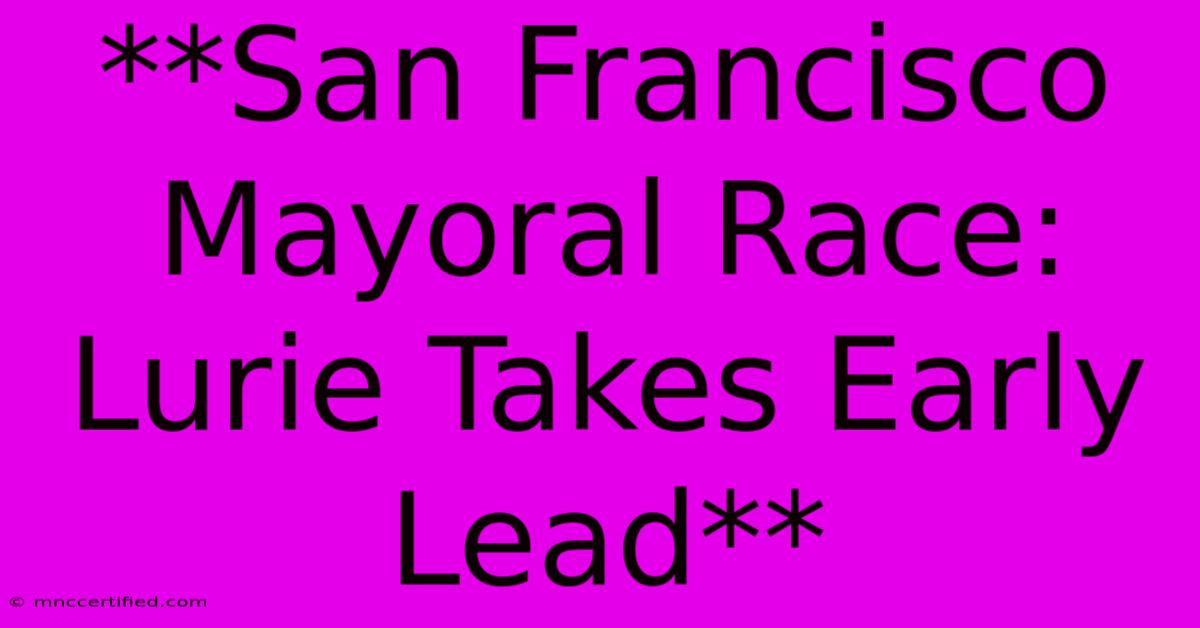**San Francisco Mayoral Race: Lurie Takes Early Lead**

Table of Contents
San Francisco Mayoral Race: Lurie Takes Early Lead in Tight Contest
The race for San Francisco mayor is heating up, with Chesa Boudin's recall election and the upcoming November election drawing national attention. London Breed, the incumbent mayor, is facing a crowded field of challengers, including state Senator Scott Wiener, former Supervisor Matt Haney, and tech entrepreneur David Lurie.
Early Polls Show Lurie Gaining Ground
Recent polls show David Lurie emerging as a frontrunner in the race. A poll conducted by the San Francisco Chronicle in early August found Lurie leading with 22% support, followed by Breed at 18%. The poll also found that 30% of voters were still undecided.
Lurie's campaign focuses on addressing the city's homelessness crisis, improving public safety, and investing in affordable housing. His tech background and outsider status are seen as potential assets, allowing him to appeal to voters frustrated with the current state of the city.
Breed Faces Tough Re-Election Battle
Breed, who was first elected in 2018, is facing a tough re-election battle. She is being criticized for her handling of the homelessness crisis, the city's crime rate, and the rising cost of living.
While Breed has made significant efforts to address these issues, including investing in affordable housing and expanding outreach programs for the homeless, critics argue that she hasn't done enough. Her support for law enforcement and her close ties to the tech industry have also alienated some voters.
Wiener and Haney Aim for Progressive Vote
Wiener, who represents the city's 11th District, is running on a platform of progressive policies, including universal healthcare, affordable housing, and environmental protection. He is expected to appeal to a similar voter base as Breed, but with a stronger emphasis on social justice issues.
Haney, the current president of the San Francisco Board of Supervisors, is also running on a progressive platform, with a focus on affordable housing and homelessness. He is considered a more progressive candidate than Breed and Wiener, and is hoping to appeal to young voters and activists.
The Upcoming Election Will Be Tight
The race for San Francisco mayor is expected to be close and competitive, with no clear frontrunner. The outcome of the election will likely depend on voter turnout, the candidates' ability to connect with voters, and the extent to which they can address the city's most pressing challenges.
Key Issues Shaping the Race
- Homelessness: The city's homelessness crisis remains a top concern for voters, with candidates offering various solutions ranging from increasing shelter capacity to implementing housing-first programs.
- Public Safety: The perception of crime and public safety is a major concern, particularly in the wake of the recall election of Chesa Boudin. Candidates are facing pressure to address these issues while balancing concerns about criminal justice reform.
- Cost of Living: The rising cost of living in San Francisco is a major factor driving voter dissatisfaction. Candidates are promising to address this issue through policies aimed at increasing affordability and promoting economic opportunity.
The San Francisco mayoral race is a microcosm of the political challenges facing many cities across the country. The outcome of the election will have significant implications for the future of San Francisco, as the city grapples with a complex set of issues and seeks to find solutions that address the concerns of its diverse population.

Thank you for visiting our website wich cover about **San Francisco Mayoral Race: Lurie Takes Early Lead**. We hope the information provided has been useful to you. Feel free to contact us if you have any questions or need further assistance. See you next time and dont miss to bookmark.
Featured Posts
-
How Much Is A Dental Bridge With Insurance
Nov 07, 2024
-
Elon Musk Joins Elite Powerful Men List
Nov 07, 2024
-
Bitcoin After Trump Win Potential Rise Explained
Nov 07, 2024
-
Unexpected Reason Behind Bayerns Champions League Start
Nov 07, 2024
-
Lhc Starts Heavy Ion Experiments Today
Nov 07, 2024